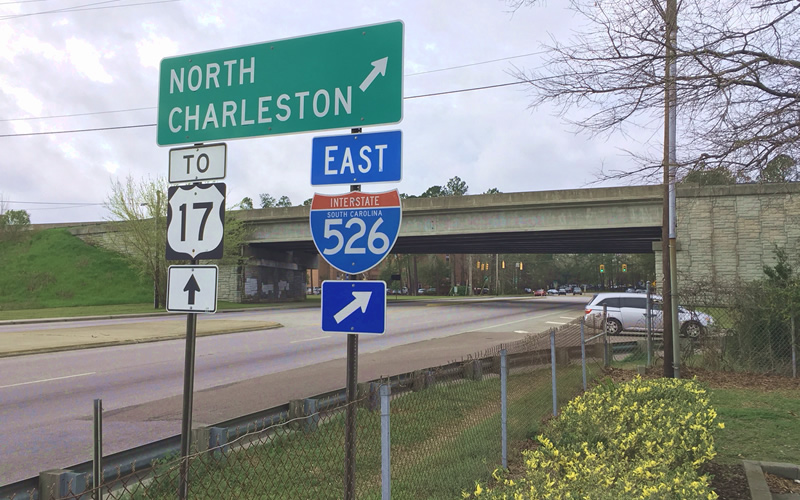By Fred Palm, contributing editor | The S.C. Joint Bond Review Committee last week sent Charleston County’s funding application to extend Interstate 526 to a four-person subcommittee to provide the due diligence of the facts of the financing. Why? Because years of skittish details about the project just do not fly.
Core issue
 The basic problem that caused the delay by the Joint Bond Review Committee is found in the half-truths, equivocations, shell games, bait and switch, balderdash and peekaboo funding sources draped with inchoate statements about other displaced projects from the majority of Charleston County Council that backs the I-526 extension (I-526X). Through proposed no-see-em fiscal sleights of hand, the council’s Majority of Five offers to push through this incredibly expensive highway with zero contingency built off of a well-founded cost estimate because at its root, the extension is unjustifiable.
The basic problem that caused the delay by the Joint Bond Review Committee is found in the half-truths, equivocations, shell games, bait and switch, balderdash and peekaboo funding sources draped with inchoate statements about other displaced projects from the majority of Charleston County Council that backs the I-526 extension (I-526X). Through proposed no-see-em fiscal sleights of hand, the council’s Majority of Five offers to push through this incredibly expensive highway with zero contingency built off of a well-founded cost estimate because at its root, the extension is unjustifiable.
Risk, risky and even riskier when you dig
There is not any stable financing plan for fully building and completing the I-526X by 2030, including the many contingencies for the unknowns. A 30-year bond, normally used for major highway construction. is infeasible as the deal is structured because no rational lender would offer us money for 30 years when we lack a flood protection plan, from a community with its risky valuable real estate assets at the shore and floodplain to back it up. It is a roll of the dice for them.
Life has unknowns; Major Interstate highway financing should not
As currently envisioned, the allocation of the total unknown dollars for the I-526X project costs minus the $420 million that the project would get from the State Infrastructure Bank (SIB) yields an unknown bill of untold millions of dollars to county taxpayers. This is a big deal because it would be the most expensive highway built in our state. All of these unknowns are what financial risk looks like when left unaddressed. It is scary and ugly. Our I-526X financing plan is not even a fiction. Even a fiction has numbers; this one has not enough.
Charleston County taxpayers get 100 percent of the risk; the state gets 0 percent
With this project as it stands now, all Charleston County taxpayers take on the risks of the unknown: Bottomless inflation, tariffs, overrun expenses, delay costs, unidentified field conditions, legal fees, change orders and corruption — plus now-higher base interest and interest increases. Ignoring the flood risk or not developing suitable protection plans, concurrent with this highway decision, means the highway completion is further challenged.
Profile in courage needed
The Joint Bond Review subcommittee now charged with reviewing this project hopefully will see through this fakery deserving of a loud public censure of the Charleston County Majority of Five. We in Charleston look to the only local person on the newly-appointed committee of state legislators, our state Rep. Leon Stavrinakis. The Charleston County Majority of Five have dealt him a lousy hand to play because our council failed to address the financing of I-526X responsibly and honestly.
Stavrinakis can choose the more general welfare and common good of all Charleston County taxpayers. Here is his challenge. Stavrinakis can step up to the big plate of all of Charleston County’s taxpayers and act in their interest. That will take incredible courage of historic proportions. Or he can choose the little plate to serve the narrow confines of his elected constituency, requiring only complicity. My money is on the integrity and courage of Representative Stavrinakis.
Plan out to 2030
Responsible stewardship of our tax dollars requires that County Council must develop realistic projections of inflows and outflows for its entire capital program to 2030 that includes mass transit, flood protections (that will take decades) and the massive I-526X project that is the most expensive highway ever built in South Carolina, the bulk paid for by a county of only 200,000 households. Saddle the county taxpayers with big overruns charges and watch those appraised values of our real estate tumble faster than a Charleston hurricane evacuation.
Bottom line
For a moment, we avoided the hallmark of yet another historical, societal and policy blunder of our governance likely to be called the Highway to Ruin. All taxpayers have the right to expect honest services from all of their elected officials acting singly or in a body and that is the best outcome for our common good, difficult as it will be here.
Time and tide wait not.
Fred Palm of Edisto Island is a retired professor of oversight and investigations at the John Jay College School of Public Management and a former executive director of the Association of Inspectors General. He writes about the Common Good.
- Have a comment? Send to: editor@charlestoncurrents.com




 We Can Do Better, South Carolina!
We Can Do Better, South Carolina!

























One Comment